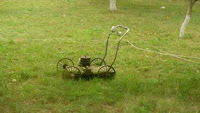On a recent visit to the hospital Ben spotted his friend Sergei mowing the lawn. The mower had a beautiful, quiet hum to it and Sergei had the contract to do this lawn as well as several others. Sergei is industrious. Not having a lawnmower did not hinder him in getting contracts--he just built one. An electric one. And it appears he used a baby carriage as a chassis and flipped over a small, electric motor. Now he cuts all lawns to one height and uses the owner's electricity to boot! No wonder he can win the contracts. However, he didn't take on the nearby football field, he left that to an impressive tractor-driven mower.
Ben has always had an interest in the criminal justice system and how it is being developed in Ukraine. This week he met with 13 probation officers from many of the neighbouring towns/cities who are in the very beginning stages of Community Corrections. Ukraine has had probation officers for only 10 years and this fall they are planning to develop a legislative base for Community Corrections. Until now, community supervision was primarily done by the police. The probation officers really reminded Ben of the staff he worked with in BC--lots of energy, enthusiasm, and good ideas.
We are also developing short videos which we hope to post on YouTube, describing the work of the Mennonite Centre here. Linda is preparing the script for a video showing a talented young accordion player. The video should be posted shortly.
Ben feels that an indicator of a civilized society is the availability of coffee shops. There is a fine shop in Tokmak which is near the market. A Saturday morning visit to the market followed by an espresso coffee for 63 cents (Cdn.) makes for the start of a good day.
Last week in Zaparozhye we stopped in for pizza. Ben went to the counter to help build his pizza, and with his charades and a little vocabulary he got chicken, tomato, cheese, and various greens as his toppings. The lady knew no English, so this took some effort. He stood around for several minutes, waiting for his pizza to bake, until the barmaid, busy making drinks, said with a smile and in perfect English, "you can go sit down--we will bring the pizza to you!"
We appreciate that our readers have many competing interests. If you wish to contribute to the work of the Mennonite Centre in Ukraine make your Canadian cheques to "Friends of the Mennonite Centre in Ukraine" or "FOMCU." Cheques from American donors should be made out to "MFC-FOMCU". All cheques should be mailed to George Dyck, Treasurer, 3675 North Service Rd, Beamsville, Ontario, Canada - L0R 1B1. Check our website at http://www.mennonitecentre.ca/ for information on credit card donations.
Thanks,
Ben and Linda Stobbe























